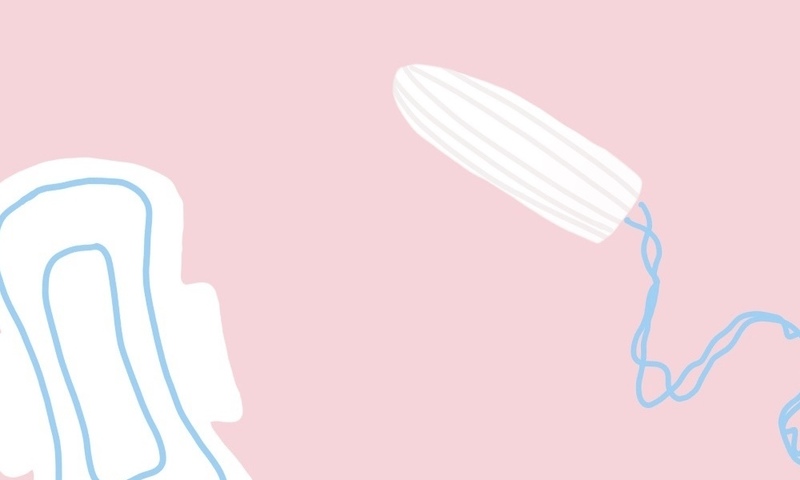I got my first period right before I started sixth grade. I was a bit of an early bloomer as I had just turned 11. I’m 21 now. I’ve had a menstrual cycle for 11 years and seven months. I’ve now had it for more than half of my life, which feels like some sort of weird milestone. In my lifetime so far, I’ve been on my period approximately 139 times. And if I speculate I will stop getting my period around 50 and maybe have 3 or 4 kids, I have about 260 periods to go. This makes me groan. The monthly ordeal is a lot. With PMSing, it’s even worse. Women reading this, you know what I’m talking about. Bleeding is only half the problem. Even though it can be painful and frustrating, I have grown very accustomed to it. Eleven years has gone by and I know the ins and outs of my body. I know what to expect. I know how to handle it. Even the especially rough cycles, I handle with that quiet, somber acceptance and only the occasional expletive.
I also know the unspoken rules of being on your period.
- Maybe don’t talk about it in public. Especially in middle school and maybe even high school. It makes boys uncomfortable.
- “Cramps” isn’t always a good enough excuse to miss class or school or anything. Try “I’m sick.”
- When in public, hide your feminine hygiene product somewhere so that people don’t know what you’ll be doing in the bathroom, like a pocket or a waistband, or even a bra.
Recently, I was having terrible cramps in the middle of class. The desks were arranged in a circle, so that conversation would be easier because we could all look right at each other. I was sitting in the corner portion of the circle, praying the teacher wouldn’t call on me to speak while I was wishing I could be in bed curled into a ball with a heating pad. About halfway through class I knew I needed to go the bathroom. I went to grab a tampon, realized I didn’t have anywhere to hide it, and made the quick pain-induced decision to just held it casually in my hand as I walked in the middle of the circle through the middle of discussion. I was keenly aware of all the people that would know I was going to the bathroom to change my tampon. When I caught myself embarrassed for being so exposed, I had a moment of clarity. Every single person in that room knows that women have a period. How dumb is it that for years I have felt the need to hide the fact that I menstruate. It’s natural. It’s the only shedding of blood that isn’t related to violence. In fact, it’s related to life. So why the shame? I propose we period-havers stop being so ashamed of it and hiding it. Especially since we have it good when it comes to periods and feminine hygiene.
In so many different cultures and religions, menstruation is seen as dirty and taboo. In some areas of India, women and girls are told that their periods will pollute food so they aren’t allowed to cook or touch pickled vegetables while menstruating. There is also a traditional belief that period blood mixed with other trash causes cancer. In Bolivia, girls often carry their used sanitary products with them until they get home from school out of fear of their classmates seeing them in the bathroom stalls. In many Asian and African communities, girls have to miss school altogether when they are on their menstrual cycle because of poor access to feminine hygiene products or lack of a place to change their sanitary products. In areas where products are more readily available, access to reusable sanitary products is often an issue. Women must often use reusable cloth. However, they don’t always have access to proper cleaning facilities.
More developed nations have their own problems too. In 2013, prior to the voting of a bill involving abortion, tampons, maxi pads, and condoms were confiscated while guns were allowed into the Texas Capitol. The UK placed a 5% tax on sanitary products, while edible sugar and razors had no tax at all, up until 2018 when a legislation eliminated the tax (though this wont go into effect until 2022). Homeless women are terribly lacking necessary products. This is what inspired GRITmas, the event GRIT organizes to pack feminine hygiene products for homeless women in LA. I, as a middle class American woman, have it easy. I have access to sanitary products and medicine. I can speak openly about it if I need to. So why did I talk about my experience finally openly carrying a tampon after 11 years and 139 periods? Because my experience, easy as it is, is an indicator of a huge problem. If a young American girl who sees TV commercials about periods, has education about her period, and access to a plethora of different sanitary products still feels embarrassed about it… something is very clearly wrong. You can only imagine what girls in Bolivia, African countries, India, and many other countries must feel. I imagine they feel an overwhelming sense of shame and dirtiness over their body’s very natural process.
The bottom line is this, periods are too taboo. So many girls and women suffer, miss school, and feel dirty and ashamed over this monthly experience. This should not be the case. Spreading awareness is important. There are a lot of initiatives and programs dedicated to breaking down the taboo and providing necessary resources to girls and women. I encourage you to do your small part. Perhaps this is educating yourself on the state of periods around the world, or donating to a charity, or ridding yourself of the shame you may feel over your own body’s natural process. A menstrual cycle, as annoying as it may be, is natural. It is created by God. The bleeding and shedding is an indicator of an amazing process going on inside our bodies. This process allows us to have children, or shall I say “be fruitful and multiply”, as God commanded us to do in the very beginning. God made it for a reason, let’s remember that.
Sources:
https://www.bbc.com/news/health-42013239
https://graziadaily.co.uk/life/real-life/bark-rags-newspapers-periods-look-like-around-world/
https://www.yourperiod.ca/normal-periods/menstruation-around-the-world/
https://changethecycle.com/blog/2017/09/menstruation-around-the-world-a-cultural-perspective/
 Biola University
Biola University




